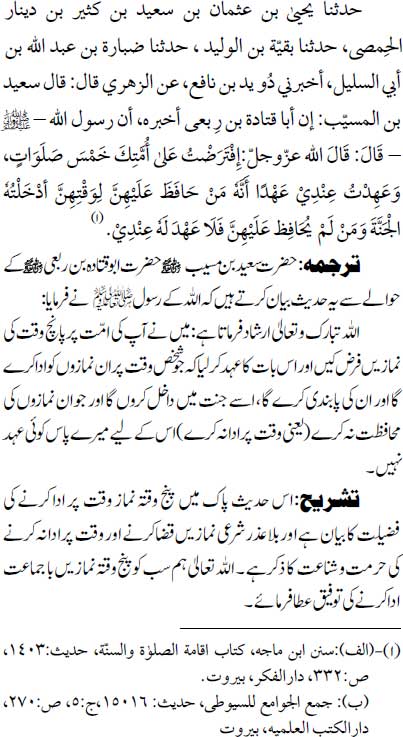
Zakat Kyon Farz Hai? Kahan Kharch Ho Gi
TAG: Fard
Hadith Qudsi: Waqt Par Namaz Parhne Ki Fazeelat

Hadith Qudsi: Waqt Par Namaz Parhne Ki Fazeelat Aur Baghair Kisi Sharai Uzar Kay Namaz Qaza Kerne Par Waeed
The Bath (Ghusl)
The major Uncleanliness (Najaasat-eHukmiyaah i.e. Hadas-e-Akbar and Janabat) can only be removed from the body by washing the entire body (bath) as known as (ghusl).
Three kinds of ghusl:
- Obligatory (Fard)
- Sunnah
- Desirable (Mustahab)
Fard Ghusl (Ghusl has to be done in these circumstances):
- Discharge of semen in any circumstances
- Sexual intercourse
- Menses (Hajdh)
- Blood discharge after childbirth (Nifaas)
In-state of janaabat the following actions are prohibited
- Salaat (Prayers of any type)
- Touching the Holy Quran
- Reciting the Holy Quran
- To enter a Masjid (mosque)
- To make Tawaaf of Ka’bah
Method Of Ghusl:
- Wash hands up to the wrists.
- Clean the private parts also known as Istinja and remove the major Uncleanliness, if any, from the body.
Perform Ablution (Wudu). - Pour some water and rub the whole body. Pour water again over the whole body, three times. Then rinse the mouth and sniff water into the nostrils.
Faraid Of Ghusl:
- Rinsing the mouth.
- Sniffing water into the nostrils.
- Pouring water over the whole body so no single part of the body remained dry including hairs.
Sunnan Of Ghusl:
- Washing both hands up to the wrists.
- Washing the private parts and such areas which are not clean.
- Having the intention (Niyah) to remove the uncleanliness.
- Pouring the water thrice, on the whole body.
Important Islamic Jurisprudence Terminology
Fard – Obligatory:
An act commanded by Allah in the Holy Qur’an is known as Fard. The following explains a Fard in detail:
a. An act that is obligatory to be executed
b. It has been proven by rigorously authenticated texts
c. The denial of any Fard renders one to come out of the folds of Islam.
d. If one omits to perform any Fard without any valid shari’i reason, then such a person becomes a fasiq (transgressor) and the person is regarded as a major sinner. [Fatawa Ridawiyyah – Vol. 2, Page 194]
Wajib – Necessary:
An act that is almost as compulsory as a Fard. The Messenger of Allah SallAllaho Alaihi wa Aalihi wa Sallam never omitted it. It is a graded second, below a Fard in its necessity.
a. An act that is compulsory to do.
b. It is proven by religious arguments through ijtihad.
c. One who denies a Wajib is misguided.
d. If one omits a Wajib without any valid shari’i reason, then he is a transgressor and liable for the punishment of Hell.
e. To miss a Wajib once (deliberately, without any valid reason) is a minor sin (Gunah-e-Saghira). However, persistently omitting a Wajib shall turn it into a major sin (Gunah-e-Kabira).
Sunnat-e-Mu’akkadah:
“Sunnat” generally means: an act done or liked by the Messenger of Allah SallAllaho Alaihi wa Aalihi wa Sallam in relation to worship. One shall gain a reward for performing a Sunnah, but there is no sin if one omits it. However, to continually omit it is a sin, and if one shows dissatisfaction with a Sunnah, then this is kufr (disbelief).
a. Sunnat-e-Mu’akkada is an act necessary to perform.
b. An act that was always performed by the Messenger of Allah SallAllaho Alaihi wa Aalihi wa Sallam, but occasionally omitted so as to differentiate from something that is Wajib.
c. One gains the displeasure of Allah Most High and His Beloved Prophet SallAllaho Alaihi wa Aalihi wa Sallam if a Sunnat-e-Mu’akkadah is omitted even if it is occasionally. Thus, making it a habit to omit a Sunnat-e-Mu’akkadah is an act of earning even more displeasure of Allah and His Beloved and inevitably, one becomes liable for punishment.
d. The status of a Sunnat-e-Mu’akkadah is near a Wajib.
e. Sunnat-e-Mu’akkadah is sometimes known as Sunnat-e-Huda.

